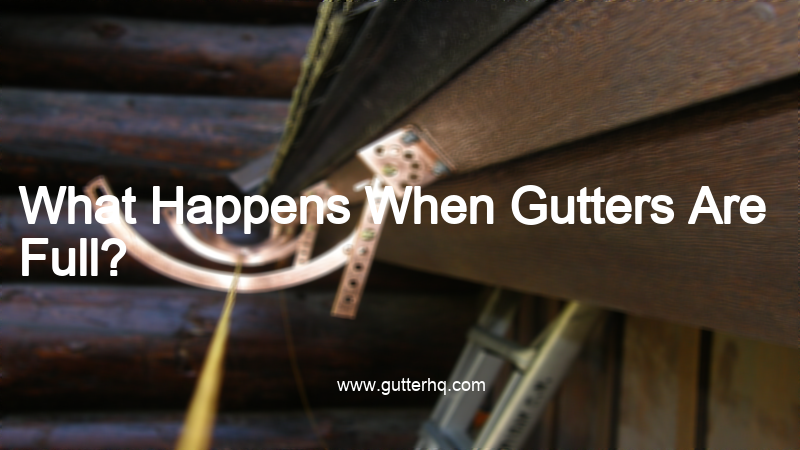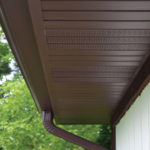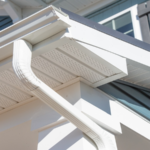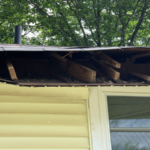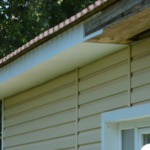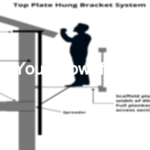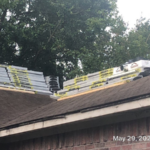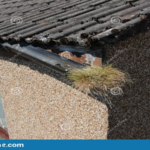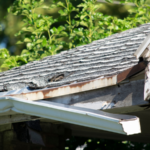- Water damage to your home: If water is pooling in your gutters, it can eventually seep into your home, causing water damage to your walls, ceilings, and floors.
- Mold and mildew growth: When gutters are full, the moisture can lead to the growth of mold and mildew, which can cause health problems for you and your family.
- Pest infestations: Gutters that are full of water can attract pests like mosquitoes, rats, and snakes.
- Roof damage: The weight of the water in your gutters can cause your roof to sag, and the water can also leak into your attic, causing damage to your insulation and wiring.
- Foundation damage: If water is draining into your home’s foundation, it can cause cracks and other damage. This can lead to serious problems like basement flooding.
If you have a full gutter, it’s important to take action to empty it as soon as possible. If you don’t have the time or the ability to do it yourself, you can hire a professional gutter cleaning service.
Is it normal for gutters to overflow in heavy rain?
Most gutters are designed to handle a normal amount of rainfall. However, during a heavy downpour, it is not uncommon for gutters to overflow. This is usually due to a clog somewhere in the gutter system. If you notice that your gutters are overflowing during a heavy rain, it is best to check for a clog and remove it as soon as possible.
What happens if gutters don’t drain?
If gutters don’t drain, water can build up and overflow, causing damage to your home’s foundation, siding, and landscaping. Gutters that don’t drain properly can also attract pests like mosquitoes, cockroaches, and rodents.
What are the effects of blocked gutters?
- Water seeping into your home: If water is unable to drain away from your home, it will start to seep in through any cracks or gaps in the structure. This can cause serious damp and mould problems, and can even damage the structural integrity of your home.
- Pests: Pests love nothing more than a damp, dark environment, so if you have blocked gutters, you could be inviting them into your home.
- Rotting fascia boards: The fascia boards are the boards that support your gutters. If they become waterlogged, they will start to rot, which can be both unsightly and dangerous.
- Cracks in foundations: If water is allowed to build up around your home, it can put pressure on the foundations, which can cause cracks.
How do I stop water from running over my gutters?
There are a few things you can do to prevent water from running over your gutters. First, make sure your gutters are clean and free of debris. This will allow water to flow freely through them. Second, you can install gutter guards or covers to keep leaves and other debris out. Finally, you can make sure your downspouts are clear and free of obstructions so water can flow freely through them.
Can full gutters cause a roof leak?
If your gutters are full of debris, water can back up and cause leaks in your roof. This is especially true if the gutters are not properly installed or maintained. Make sure to clean your gutters regularly and keep an eye out for any leaks or damage.
Why are my gutters full of water?
There are a few reasons why your gutters might be full of water. One possibility is that your gutters are too small for the amount of rainfall your area receives. Another possibility is that there is something blocking the gutters, such as leaves or debris, which is preventing the water from draining properly. If your gutters are full of water, it is important to have them cleaned out as soon as possible to prevent any water damage to your home.
Can full gutters cause basement flooding?
If your gutters are full of debris, they can cause water to back up and overflow into your basement. This can lead to flooding and serious water damage. To prevent this from happening, it’s important to keep your gutters clean and free of debris.
Why are my gutters so loud when it rains?
Your gutters are most likely loud because they are full of debris and need to be cleaned. When rainwater hits the debris, it creates a loud noise. You can fix this problem by cleaning your gutters on a regular basis.
How do you tell if gutters are overflowing?
- Look for water flowing over the top of the gutters.
- Look for water coming out of the gutters at the seams.
- Look for water running down the sides of the gutters.
- Look for water pooled at the base of the gutters.
Final Talk
If your gutters are full, then water can’t flow through them properly and will instead overflow. This can cause water damage to your home, as well as create a breeding ground for mosquitoes and other pests. To avoid these problems, it’s important to keep your gutters clean and clear.
